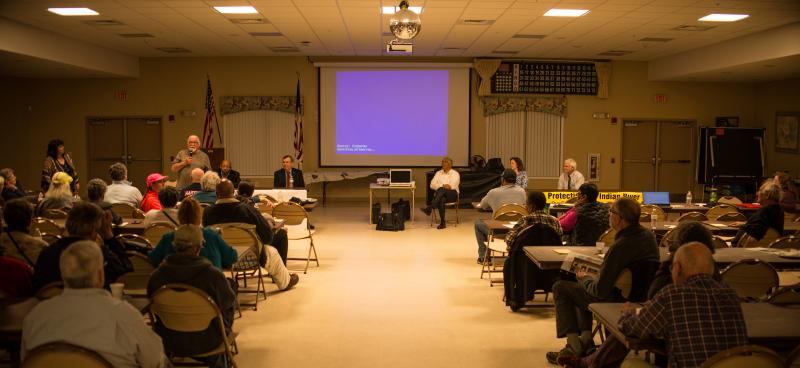A public forum and information session in Millsboro, March 14, gave residents of Sussex County an opportunity to hear from a panel with diverse expertise and educational backgrounds regarding the state of well water contamination and potential effects not only the environment, but human health, particularly in Sussex County.
The forum made way for comments by concerned and committed citizens from Sussex County, as well as surrounding counties and various parts of the Eastern Shore. The event, held at Indian River Senior Center, was organized by the Socially Responsible Agricultural Project, with other sponsors including Protecting Our Indian River, Keep Our Wells Clean, and the Concerned Citizens of Prime Hook organizations. The focus of this event was to address the increasing apprehensions and worry regarding water pollution while supporting information was presented in the form of case studies, research, and other scientific methods of analysis.
The local leader of the national nonprofit organization SRAP, Maria Payan lead the discussion “We have credibility coupled with decades of experience,” said Payan before introducing the first member of the panel.
The panel consisted of five speakers ranging from experts in the field to doctors and research scientists who addressed the community impact of spray fields, local geology and hydrology, and the risks to public health that these connected issues have on the environment and public health.
“This is your evening. You have the ability and power to make change related to these connected issues relating to pollution and inequities in income and health in your community because you are citizen scientists,” said Dr. Robert Musil, president of The Rachel Carson Council. Musil spoke about the lack of private studies on well water and their contaminants, and how multiple pollutants can lead to life altering health effects for those in a community surrounded by industrial farms and factories.
John Austin, a retired Environmental Protection Agency chemist, was the next panel member to speak, presenting information on nitrate levels in the water resulting from the misuse of planning and lack of structure related to large corporations in Sussex such as Allen Harim, Mountaire and Blessing Compost, which all show evidence of increased nitrate levels in surrounding wells. “You are the first line of defense,” he added before opening the floor for the next panel member.
“We want people to understand the science, and be able to make decisions and conclusions for yourselves,” said Judith Denver, a hydrologist and recently retired project chief for the National Water Quality Assessment Program. Denver spoke about the flow patterns and unique geological and geographical elements of Sussex County; making residents more vulnerable to possible pollution given the soil types and aquifer make up -mostly sand and gravel. She also mentioned how the greatest contributor of issues to groundwater was farm or agricultural land, which also happens to be the largest section of land use in Sussex County and the relevant connection.
“When you are unincorporated that is contamination without representation,” echoed Dr. Sacoby Wilson, an environmental health scientist and associate professor at University of Maryland. Sacoby spoke much about the Environmental Justice Movement, which calls for the fair treatment of all people regardless of race, income, class and place. He spoke of the hidden hazards that are invisible, and how these should be addressed despite the Safe Drinking Water Act not protecting wells (water), which all of Sussex receives their drinking water from. “We are paying the costs for companies being able to pollute without proper reprimanding, and we need to fix our broken system by holding politicians accountable. We are not anti-farm, but taxpayers should not absorb the costs both economically and physically for the issues that are present,” he said.
Dr. Mohammad Akhter, former executive director of the American Public Health Association, was the last speaker of the night before attendees could interact with the panel. “We have not changed things because we have not yet come together, and today is the day to take leadership and create bonds between people, organization and government to solve these issues now,” said Akhter. He spoke about how “everyone is in this boat together” and how we need to make changes to leave a bright and positive future for generations to come. Akhter also reviewed different steps to analyze and address the problems at hand when speaking of well water and air pollution in Sussex County.
The packed audience, with some left standing, was able to voice questions and concerns to the panel, receiving advice and guidance from the experts. For more information on getting involved in this cause, all the organizations sponsoring this event as well as others are available to contact via email or by visiting their websites.





















































